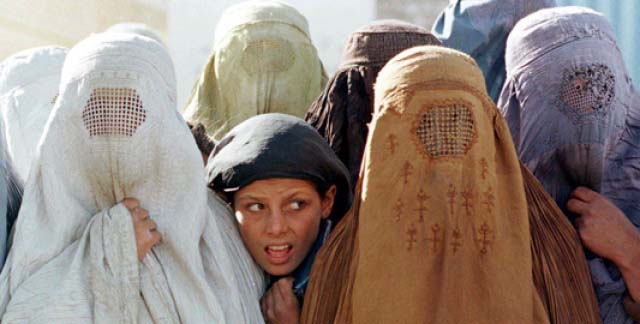A group of feminists believe that women cannot get rid of sexual cruelties and atrocities by gradual changes and amendment. According to them, patriarchy is a systemic phenomenon; gender equality is possible only by demolishing the system of patriarchy. They believe that those social and cultural norms which reiterate the slender figures and sympathetic attitudes of women, aim to extend their inferiority and obedience. They further believe that objectifying women through media, models and advertisements change women to sexual objects with the intention of amusing and pleasing men.
Afghan women have suffered greatly under patriarchy, especially during the Taliban’s regime, and their rights and dignity were violated on a large scale in Afghanistan. Their blood is still spilled and they fell prey to violence and honor-killing on the grounds of their gender. Women are treated as pariah and stoned to death in tribal belts and in Taliban-dominated areas. Members of the Taliban insurgents sprayed corrosive acid on the faces of school girls and flagellated the women in desert court with great inhumanity. In suicide bombings, the lifeless bodies of women, as drops of boiling blood trickle down their wounds, fill one with a strong sense of sorrow and disgust.
Women human rights are trampled upon in collective and individual spheres. Their freedoms and social role are curtailed, mainly in villages – where traditional custom holds strong sway. Not surprisingly, the girls are not entitled to decide whom to live with and it is their parents to choose their life-partners – this is almost common in some rural areas across the country. The birth of female child can hardly force smile to her parents’ lips and it is assumed that they will bear the brunt of discrimination and patriarchal system.
On Tuesday March 08, 2016 marked as Woman’s International Day around the world, including Afghanistan. However, the tragic death of Farkhunda, a 27-year-old woman killed by angry mob on the 19 of March, 2015, adds insult to the public injuries and reminds the bloody episode and peels the scab that just covered the open wounds. The Office of the Attorney General of Afghanistan said on Monday that it has concluded Farkhunda’s case and sentenced 17 persons to prison. “Special tribunals set by the AGO for addressing violence against women so far have completed 9,572 cases in the provinces. Amongst the cases processed so far are 828 cases of murder, 2,453 cases of sexual abuse, 75 cases of kidnapping of women, 253 cases of forced marriages, 1,912 case related to beating and some other eighteen cases”.
Perhaps, the images of abused and helpless Afghan women incessantly flood our minds, undermining the significant role of women as agents of change in Afghanistan. During the 1920s and 70s, a period of economic and political stability, a large number of Afghan women asserted their rights and continued their education and professional pursuits. These women belonged to a privileged economic background; all the same their role and aspirations offer the world an alternative narrative. Acknowledging the agency, contributions, and strong voice of Afghan women does not undermine the stories of women like Nazia, an 18-year-old Afghan woman whose nose and ears were sliced off by her husband and appeared on the cover of Time magazine in August 2010, or Sitara, a 30-year-old women whose nose and lips were lopped off by her addict husband in Herat province in 2013 and their audacious spirit, whose story of sufferings too many for our world.
Despite the progress made, women’s struggle for civic and human rights still has a long way to go. Three decades of war has left many Afghans both eager for change and afraid of it. There are still many instances of ordinary women experiencing domestic violence, sexually abused, or being forced into marriage. Women in senior leadership roles – such as in parliament or the police – are still being murdered. Some men feel threatened by the presence of women in senior positions. These men see women’s rights as the “westernization” of Afghan culture.
To the unmitigated chagrin of Afghan women, the Afghanistan’s presidential election in the solar year of 1393 was not a panacea for their bleeding wounds. They fell victim to gang violence and rape constantly as ever before. In other words, the macabre stories and hackneyed phrases of violence made repeated headlines on national and international newspapers – and continue up to now.
Women should no more suffer men’s fractious attitudes, mental and physical tortures. The religious guidelines and country’s law should be practiced upon and the patriarchal system should end so that women’s rights and dignity be held in respect. The Constitution of Afghanistan states in article 22 as, “Any kind of discrimination and distinction between citizens of Afghanistan shall be forbidden. The citizens of Afghanistan, man and woman, have equal rights and duties before the law.” Moreover, article 24 asserts, “Liberty is the natural right of human beings. This right has no limits unless affecting others freedoms as well as the public interest, which shall be regulated by law. Liberty and human dignity are inviolable. The state shall respect and protect liberty as well as human dignity.”
Since women are considered inferior neither in religious narratives nor in country’s law, the government should enforce the law strictly and empower women through safeguarding their rights and dignity.
Home » Opinion » Women Are Deemed Inferior
Women Are Deemed Inferior
| Hujjatullah Zia

